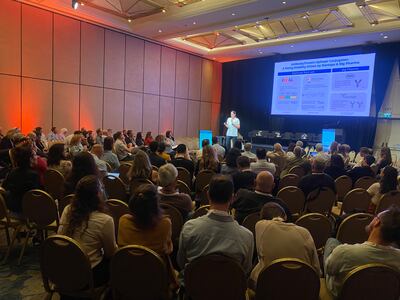Established only last year and incorporated in France and Spain with an initial seed from Paris-based VC firm AdBio Partners, Kiji Therapeutics is grounded in science from the Spanish public research institution Ciemat, research consortium Consorcio Centro de Investigación Biomédica en Red (CIBER), and the Jiménez Díaz Foundation.
Forte, who was entrepreneur-in-residence at AdBio, had been sent to Spain by the VC to assess the value of the platform created by the research collective. He was impressed by the potential of the platform, which brings together two technologies that, he believed, could create a value proposition for patients in cell therapy.
Spanish Science
That technology develops gene engineered induced pluripotent stem cell-derived mesenchymal stem cells (iPSC-MSCs) with demonstrated efficacy and consistent and flexible manufacturing. The first pre-clinical products are adipose derived MSCs transduced with IL10 and CXCR4, which drives efficacy through synergistic immunomodulation (IL10) and homing (CXCR4).
“We are able to take the cells where they should be and then deliver the anti-inflammatory stimuli and control in a very targeted, powerful, and augmented way,” explained Forte. “We can do that because we can use cells that have been used and modified for a long time, so we know how they behave. We’re able now to modify that because we have the technologies to edit the genomes of the cells,” he said.
Forte explained that the company is using stem cells in an optimized way, it “engineers them, and educates them to optimize their function. In doing so, we solve manufacturing issues, and we optimize therapeutic benefit”.
Forte, president and chairman of the board for the International Society of Cell and Gene Therapy (ISCT), is no stranger to spotting the value in new technology, having served as CEO of Bone Therapeutics, Zelluna Immunotherapy AS, and CMO/COO of TxCell SA. He also has in-depth working knowledge of the European regulatory field, having served as a CHMP member in his native Portugal. To top off his exhaustive resumé, Forte also serves as a professor at Lisbon University, and is a board member at the Alliance for Regenerative Medicine (ARM).
With access to Spanish R&D and GMP manufacturing facilities in Madrid and Navarra, the biotech is moving its first asset, KJ01 into the clinic for its first Phase I trial in the middle of 2025 for patients with Steroid-Refractory acute graft-versus-host disease (SR-aGvHD).
Unmet Medical Need
Graft-versus-host disease (GvHD) can occur after a bone marrow transplant or similar procedure when the donor’s immune cells perceive the recipient’s tissues as foreign and attack them. Each year, about 30,000 allogeneic bone marrow transplants are performed, with 35%-50% of recipients developing acute GvHD. Steroids are the common treatment for GvHD, but they fail in up to 50% of cases, often leading to fatal outcomes.
There is currently no formally accepted standard of care for SR-aGvHD. The British Committee for Standards in Hematology and the British Society for Bone Marrow Transplantation formed a joint working group which outlined several options for doctors treating the condition starting with extracorporeal photopheresis (ECP), anti–TNF-α antibodies, mechanistic target of rapamycin kinase inhibitors, mycophenolate mofetil, methotrexate, or anti–IL-2R antibodies.
Kiji believes its cell therapy approach could benefit around 4,000 patients a year. But of course, Kiji is not alone in targeting SR-aGvHD. Australian cell therapy company Cynata Therapeutics Ltd. is using its Cymerus platform to treat aGvHD with its own MSC approach. Phase II studies enrolled their first patients in March 2024.
Furthest along the pipeline is Mesoblast Limited with its cell therapy, remestemcel-L, an IV-administered therapy comprising culture-expanded mesenchymal stem cells derived from the bone marrow of an unrelated donor. It works by downregulating the production of pro-inflammatory cytokines, increasing production of anti-inflammatory cytokines, and enabling recruitment of naturally occurring anti-inflammatory cells to involved tissues.
The Melbourne-based firm has a PDUFA date of 7 January 2025, for remestemcel-L for pediatric patients with SR-aGvHD, following a complete response letter (CRL) issued in August 2023. (Also see "Mesoblast Plans Small Trial After Second CRL For GVHD Cell Therapy" - Scrip, 4 August, 2023.)
Regulatory Environment
This PDUFA date is important for the field, said Forte. While other regulators have agreed on the therapeutic benefit, this will provide FDA confirmation that unmodified MSCs have benefit in GVHDD.
“We have compared those types of cells with our modified cells in animal models, and we have an increased benefit about 70%. We’re confident that if we see that replicated in our clinical trial that we come at the time where Mesoblast has established the base value of MSCs, and we can deliver the incremental value of engineered MSCs,” he explained.
Once proof of concept has been proven, this could launch engineered MSCs to new therapeutic levels. The company has animal data showing increased benefit in GVHD, in inflammatory bowel disease (IBD), and in skin conditions. The next stop for Kiji would be IBD, specifically IBD patients with an IL-10 and macrophage dependent phenotype.
The company also plans to trial cell therapy in psoriasis, a condition that Forte describes as a “significant and very important” unmet medical need.
Issues Of Access
The regulatory environment is tough but collaborative, says Forte, and the conversation must now turn to access, which ultimately means treating patients that are in need. To meet this unmet need, product developers need to ensure their therapies are produced at an adequate cost of goods and administered in the right condition. There is also the question of affordability, risk sharing, and new models of payment, he said.
Forte’s work at the ISCT means he is exposed to conversations about the spectrum of cell and gene therapies. “We need ethical development of products for patient access globally. We need to develop the capacity of these products to be administered, not just in New York, but also in the ‘middle of nowhere’ [and] in other countries. We need to work on that final element of access and the different parameters that enable access,” he said.
With this in mind, Kiji’s vision for manufacturing and administering its product is a simple one. Using its two small manufacturing sites in Madrid and Navarra is a deliberate step to prove that the company can perform tech transfer, with one eye on a future where the manufacturing can be transferred to a CDMO or to other manufacturers closer to the patient.
“Once you get the fully developed product, you can produce it anywhere because it becomes like another product in traditional biotech. As you produce it, you cryopreserve and store it, and then you can ship it and use it anywhere,” Forte explained.
De-Risking For Investment
While AdBio provided seed funding for Kiji, the company is now looking globally for investors to complement that investment. The company is incorporated in Paris, but all activities happen in Madrid.
To honor this dual arrangement, the company is named after Pheasant Island, an uninhabited island on the Bidassoa river between France and Spain, whose administration alternates between the two nations every six months. As Pheasant Therapeutics was not an attractive name, the founders chose to use the Japanese translation of pheasant, Kiji.
It is not an ideal time for a small startup to look for investment. A series of macro aspects are impacting the field causing investors to modulate their exposure to risk. While this scenario is impacting biotech in general, cell and gene therapy is an area where the level of risk and the level of investment is intrinsically linked.
This makes the clinical confirmation of Kiji’s technology imperative. “We derisk the project by confirming in the clinic what we’ve seen in the pre-clinical data. That’s also why a lot of the companies are trying to find ways to have that data, to de-risk the project and bring the investors in,” said Forte.
Through Forte’s immersion in the cell and gene therapy industry, as well as his company background, he knows the importance of differentiation, value creation, and access. “Commercialization is a vision that needs to be present on everything you do from day one. We need to make a product that is easy to use and cost effective,” he said. “All those elements, all those parameters, are going to be key to a successful commercialization. Even before the first clinical trial, in everything that I do, I am already thinking about how I can improve my chances of success at the final stop, which is commercialization,” he said.






